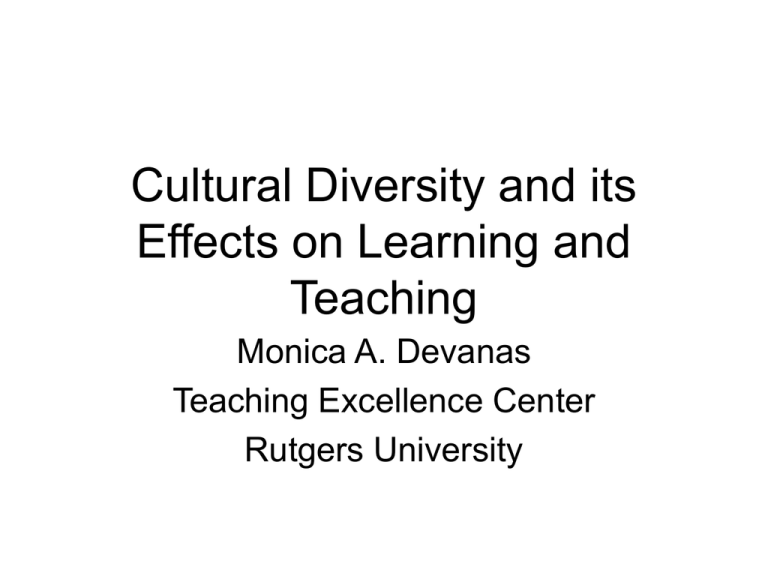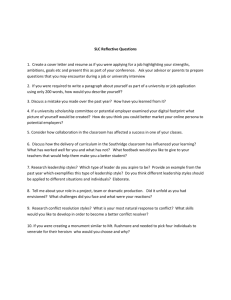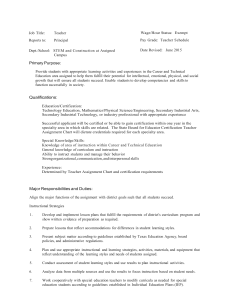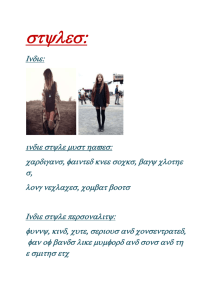Cultural Diversity and its Effects on Learning and Teaching
advertisement

Cultural Diversity and its Effects on Learning and Teaching Monica A. Devanas Teaching Excellence Center Rutgers University Diverse Students • motivational and learning characteristics of students different from white, middle class males • interplay of social and cultural diversity and learning style, curriculum content and instructional style Diverse Students • Social relational skills, values, characteristics • Information processing orientations and skills • Communication patterns • Learning styles and strategies • Motivational styles • Psychological characteristics Cultural, Learning and Motivational Styles • Non-traditional • Traditional – Social interactions – Peer cooperation – Performance – Visual perception – Symbolic expression – Narrative – Independence – Competition – Verbal skills Cultural, Learning and Motivational Styles • Females – affiliation – relationships – collaborativecooperative interaction • Males – separation – autonomy – competitive achievements Learning Styles Relational – – – – – holistic, global intuitive social verbal nonacademic task oriented – affected by opinions – withdraw from drill – style conflicts with school environments Analytical – – – – – – focus on detail sequential impersonal abstract academic task oriented not affected by opinions – persist in drills – styles matches school environments Experiential Learning Model Concrete Experience Testing Implications of Concepts in New Situations Observations and Reflections Formation of Abstract Concepts and Generalizations Experiential Learning Model Concrete Experience Testing Implications of Concepts in New Situations Observations and Reflections Formation of Abstract Concepts and Generalizations Experiential Learning Model Visual Concrete Experience Testing Implications Observations and of Concepts in New Reflections Situations Connected Separate Formation of Abstract Concepts and Generalizations Verbal Learning Styles and Strategies Felder and Soloman Model Active/Reflective Sensing/Intuitive Visual/Verbal Sequential/Global http://www2.ncsu.edu/unity/lockers/users/f /felder/public/ILSpage.html Effective Teaching Strategies • Concrete Experience- readings, examples, fieldwork, problems, observations, simulations, primary texts, films, games Effective Teaching Strategies • Concrete Experience- readings, examples, fieldwork, problems, observations, simulations, primary texts, films, games • Reflective Observation - logs, journals, discussion, brainstorming, thought/rhetorical questions Effective Teaching Strategies • Concrete Experience- readings, examples, fieldwork, problems, observations, simulations, primary texts, films, games • Reflective Observation - logs, journals, discussion, brainstorming, thought/rhetorical questions • Abstract Conceptualization - lecture, papers, projects, analogies, model building Effective Teaching Strategies • Concrete Experience- readings, examples, fieldwork, problems, observations, simulations, primary texts, films, games • Reflective Observation - logs, journals, discussion, brainstorming, thought/rhetorical questions • Abstract Conceptualization - lecture, papers, projects, analogies, model building • Active Experimentation - projects, fieldwork, homework, laboratory, case study, simulations UCLA Freshman Survey 1998 33rd year sampled: 383,815 students, 668 Two & Four Year Institutions adjusted: 275,811 students, 469 Institutions represent: 1.6 M entering 1st year students UCLA Freshman Survey • 82.9% tool • 65.9% • 54.2% • 72.9% • 80.4% Internet – educational, research email chat rooms “other” play computer games UCLA Freshman Survey private email in HS homework 80.1% 90.2 public black colleges 41.4% 77.6 UCLA Freshman Survey Interest in: Politics Law 1998 – 25.9%* 3.0%* 1997 – 26.7 3.3 1966 – 57.8 1989 – 5.4 * record low UCLA Freshman Survey Volunteerism in HS: 1998 – 74.2* 1997 – 73.1 1989 – 62.0 * record high UCLA Freshman Survey Academic Disengagement: (“bored in class” in HS) 1998 – 37.7* 1997 – 36.0 1985 – 26.4 * record high Implementing the Principles of Good Practice for Diverse Learning Styles Technology as the Lever Promising Instructional Technologies Visual Materials – artifacts – overhead projector and slides – computer graphic presentation – movies, video, videodisk Promising Instructional Technologies Visual Materials – artifacts – overhead projector and slides – computer graphic presentation – movies, video, videodisk Auditory Materials – tapes – instruments – human voices Classroom Technologies “Smart” Classrooms (HEFT) • see, hear, breathe • equipment: – overhead, ceiling, 16 mm, slides – VCR, CD/Video disk – computer connections – audio tape player/recorder Video Conferencing “Open your Classroom to the World” languages, cultures, literature, film Students at a Distance Research, Meetings, Seminars “EXTRA-classroom” Instructional Technologies • Electronic data bases – library – web-based • Graphic Data • Statistical Data “EXTRA-classroom” Instructional Technologies • • • • • • Email Listserv newsgroups/discussion groups “chat rooms” real time web-based materials on-line courses Uses of Email • Communication - Q&A, “virtual” office hours • Information distribution - FAQ’s, announcements • Course Organization - homework, assignments • Content Enrichment Intro to Macro & Micro Economics http://TeachX.rutgers.edu/gag Biomedical Issues of AIDS http://www.rci.rutgers.edu/~devanas/AIDS Student’s Listserv Discussions • megan wrote: just a question to ponder.... how do you think life will change if a cure is found. do you think people will change their attitudes … • In respone to megan if there was a cure i think people will have another excuse to hace unprotected sex. I know many people who refuse to use… • For the past week or so, I have received many emaill messages about a conspiracy theory. It bothered me to hear that people had that little faith in their government….. • in response to what megan wrote...i think people will still have protected sex because the cure for AIDS is going to be very expensive, and besides … • I must say that for those of you who believe that our government would not withhold the cure for AIDS, have to much faith in their government… Listserv Discussion Groups • Group 2: Should convicted criminals be required to disclose their HIV status and/or be tested for HIV? • Many people agreed that, for the majority of cases, a criminal should not be forced to be tested and therefore disclose their information. Afterall, as someone stated, "having your personal medical records made public is not part of the sentence." Others felt that it would be too expensive to test everyone in prison and that the money could be used elsewhere. The fact is that other inmates would discriminate against the HIV positive person and a great deal of violence would occur. If you think about it, why should criminals be forced to be tested and/or forced to disclose their personal medical history just because they are in jail? Afterall, they don't test you for any other diseases in jail- why only HIV? Conferencing Software • Conferencing - Web-Based Discussion – Nicenet (http://www.nicenet.org) – NetscapeProfessional, Allaire Forum • WebCT (https://webct.rutgers.edu/) – conferencing – organization – testing Testing Software • Half-Baked Potato Software – – – – http://web.uvic.ca/hrd/halfbaked/ JBC on-line quizzes (multiple choice) JQuiz (short answers) Markin (annotate text) • PerfectMatch (beta preview) – http://biomedia.bio.purdue.edu/PerfectMatch/ – match image with concept Precautions for using Instructional Technologies • Purpose • Evaluation of Effectiveness – teaching – learning • Back-up plans • Reliance on Infrastrucure “Highly Interactive” Learning Model • Bork Model • “New Learning Structures” • learning and evaluation blended – frequent interaction (20 sec) – Socratic format – memory of learning style http://www.educause.edu/ir/library/html/erm9946.html Assessment • • • • • Student survey Instructor satisfaction Attendance Graduates quantitative scores “Seven Principles of Good Practice” Increase Contact Cooperation Active Learning Feedback Time on Task High Expectations Respects Diverse Talents and Ways of Learning Chickering and Ehrmann 1996 IMPLEMENTING THE SEVEN PRINCIPLES: Technology as Lever. AAHE Bulletin Teaching Effectiveness Goal Research - Strategies - Assessment “Multicultural Teaching Repertoire” is…. …effective teaching for all students



